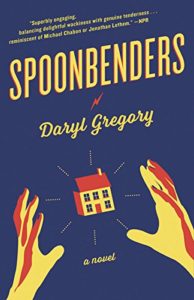I attended a talk given by Dr Joe Gallenberger last month on psychokinesis and winning in Las Vegas where he had briefly described spoon bending that seems to defy the laws of physics. When I was growing up, a self-proclaimed psychic known as Uri Geller would go on talk shows bending spoons at the neck between the bowl and the handle. Two rather famous people, Dean Radin and Michael Crichton, claimed success at gatherings known as “PK parties”. Mr Radin had folded the bowl of the spoon over without effort in front of several witnesses. He later attempted to bend the bowl of a similar spoon with conscious force but was unsuccessful without the aid of pliers. I asked Dr Gallenberger if there was a study done on spoons bent by mechanical force versus those bent by supposed psychic means. Apparently, there was a physicist, Dr Wilbur Franklin, who had placed spoons bent by Uri Geller and those bent by the usual method in an electron microscope and the findings are described in a book called “The Spoon Benders”. I could not find the book Dr Gallenberger recommended but did come across this award-winning work of fiction.

Spoonbenders could have the subtitle of “The Misadventures of the Amazing Telemachus Family” with all the bad choices and screw-ups that plague the characters. Of all the novels of the paranormal I have pondered reading and have read, this one was refreshingly different. There is no ghost hunting, there is no murder (well, not one you’re trying to solve as part of the plot), and there are a couple of shysters mixed in with the family members with true psychic ability. Teddy is the family patriarch who had once made a living as a con-artist, card shark and magician’s magician. He meets the love of his life, Maureen, who is the “real deal” (a clairvoyant who uses astral projection with ease), during a Parapsychological research study at the University of Chicago. He deceives the professor using his talents as a mentalist but she just “knows” much to Teddy’s consternation. They have a family, two boys named Buddy and Frankie and a girl named Irene. Buddy is a precog living in the past, present and future all at once but he sees that his future has an imminent expiration date. Frankie is a frustrated psychokinetic who would rather be like his dad but talentless in that regard. Irene is the human lie detector and mother to the boys after Maureen dies of cancer.
If you think that being psychic means that your world would be less fraught with difficulty, this book will dispel you of that notion. Frankie and Teddy are guilty of falling in with the mobster crowd with dire consequences. Buddy spends his days performing odd jobs around Teddy’s house without anyone really knowing what he’s up to. Irene is just angry at being lied to all of the time. Irene’s son, Matty finds out that he too is an Amazing Telemachus having inherited Maureen’s ability to astrally project. Of course, he gets pulled into Frankie’s ill-thought-out schemes. Oh, the government is also involved. Agent Destin Smalls, who had once recruited Maureen into the Stargate program, would like nothing more than to involve the other Telemachuses (or is it Telemachi?) in his efforts to save America from Its Enemies.
Writing about how psychic ability seems to really work is tricky and many authors dress up the skill to make their books more interesting. Mr Gregory has embellished his characters to a high degree for the benefit of the plot but he has got some accurate references in the novel. There was a Stargate program run during the late twentieth century with the primary goal of defeating Soviet psychic spies and locating Soviet places or people of interest. People like Maureen were recruited to use Remote Viewing techniques to find these targets with some level of success (see Joe McMoneagle). Psychic ability does seem to run in families but that may be more to do with a family that accepts the ability than genetics. Beyond that, the Telemachus saga is simply a fun romp in the psychic world of a typically screwed up family.
Although Mr Gregory has written novels for young adults, this novel is rife with f-bombs, drugs, sex, and violence and therefore is not suitable reading for anyone under the age of seventeen. Also, if you read his acknowledgements page, he is a Randiphyte or one of those sceptics that thinks all psychic ability is fakery either intentionally perpetrated or done by the delusional. He makes a mean reference to Russell Targ, one of the Stargate principle scientists who went from studying lasers to the remote viewing project. Russell Trago, a.k.a. “slick-haired mole boy”, is trying to show Maureen a bent spoon technique with her house key. He is in earnest that all she needs to do is concentrate to succeed but is unable to prove his point because Teddy sends him packing. The novel spends its last twenty pages or so in a Rube Goldberg style ending that is both compelling and amusing. All in all, I recommend this novel though I wouldn’t recommend contacting Mr Gregory about psychic ability…he might just refer you to a psychologist instead.
